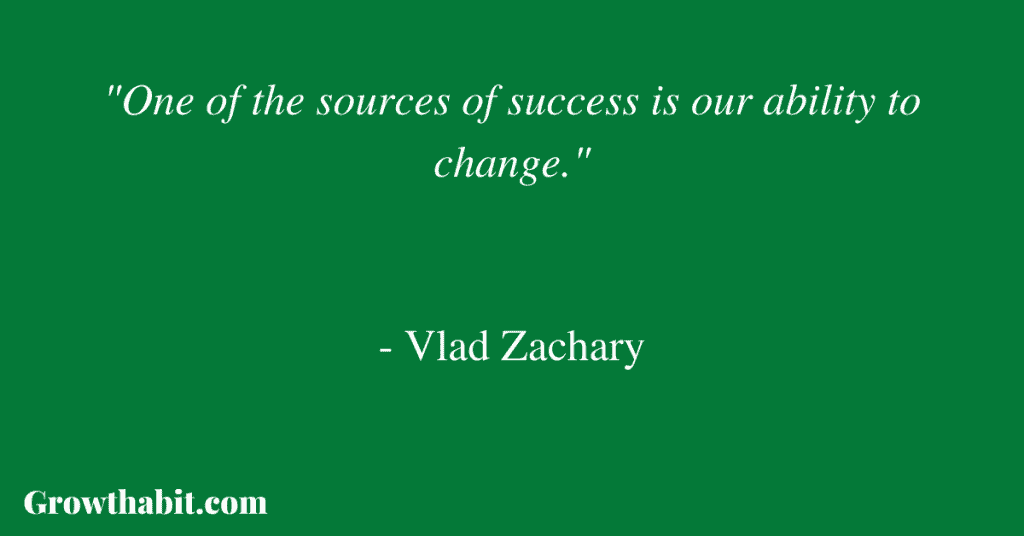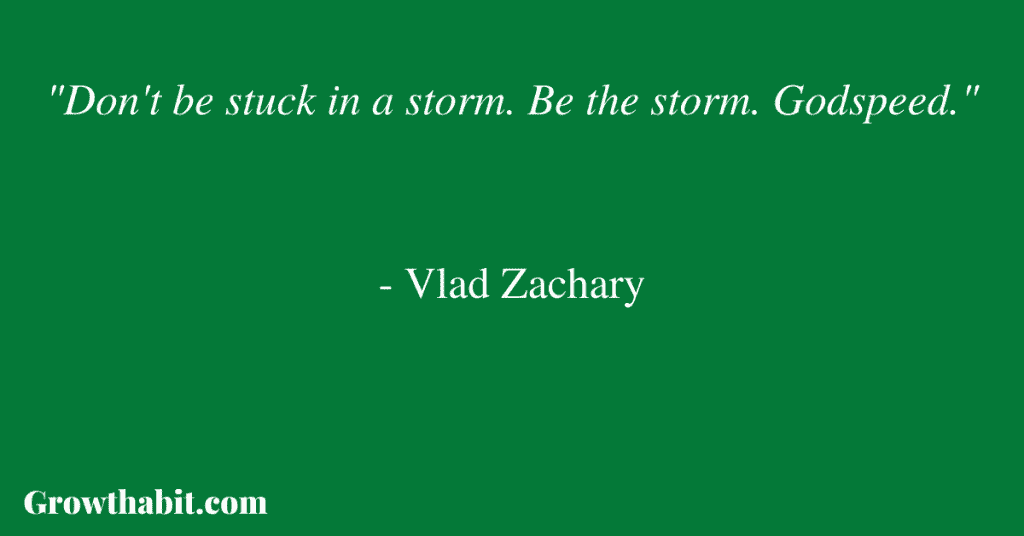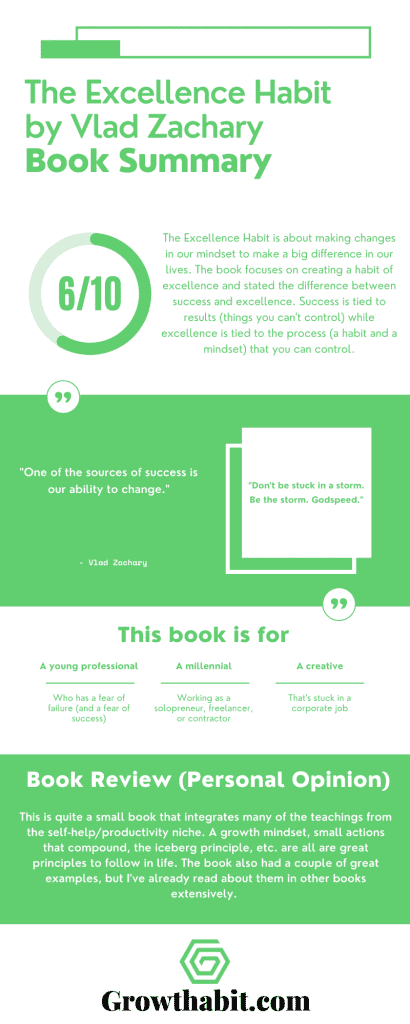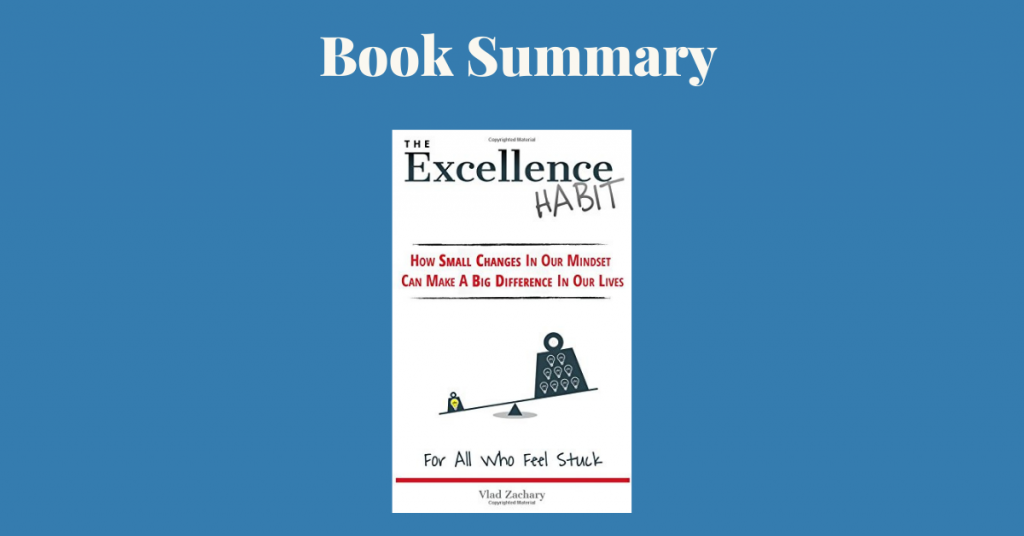The Excellence Habit is about making changes in our mindset to make a big difference in our lives. The book focuses on creating a habit of excellence and stated the difference between success and excellence. Success is tied to results (things you can’t control) while excellence is tied to the process (a habit and a mindset) that you can control.
Book Title: The Excellence Habit – How Small Changes In Our Mindset Can Make A Big Difference In Our Lives: For All Who Feel Stuck
Author: Vlad Zachary
Date of Reading: December 2016 – January 2017
Rating: 6/10
What Is Being Said In Detail:
The Excellence Habit has five chapters titled One, Two, Three, Four, Five.
The first chapter teaches us about the three rules of excellence:
- The Iceberg Principle. The majority of our effort is invisible to the eye, but we still need to keep on working on our excellence. Because all of that work (process) will pay off in the future in unexpected ways.
- The Law Of Not Selling Out. The law states that we need to “stick to our guns” no matter what. And by “guns,” the author means standards, core values, beliefs, and principles.
- The Journey Mindset. Excellence is a journey and we need to stick to the path that might lead us to unexpected places. But if we follow The Law Of Not Selling Out while having The Journey Mindset, the end result will still be aligned with who we are and what we believe in.
The second chapter teaches us about:
- The Tennis Ball Effect. We can control our thoughts, actions, and response to any situation we find ourselves in. But once “the ball hits the net and goes up in the air,” we’re no longer in control. Focus on what you can control.
- The Broken Window Of Our Soul. The power of context is usually bigger than we give it credit. Create an environment that helps you with excellence and you will increase your odds.
- Wiping Out Our Inner Graffiti. It’s about reframing our mindset to “I belong here” and making sure we’re working on our psychological wellbeing.
- Changing Our Bodies To Change Our Minds. Small tweaks to your body language can increase your confidence and affect your mind positively (power poses).
The third chapter talks about:
- Rewriting Our Story. Start telling yourself a story that will help you achieve excellence. It will help out with changing your mindset.
- Addicted To Excellence. If you’re a high-achiever, frame your tasks as tasks and you will be motivated. If you’re an under-achiever, frame them as fun and you’ll be more motivated to do them.
- The N-Effect. The N-Effect reduces our motivation with the increase of total competitors. So if you want excellence, try to frame the tasks as if you have no competition (competing only against myself as an example.)
The fourth chapter is about:
- “Move Your Own Cheese” For Organizations. As a big organization, cultivate and establish entrepreneurial habits (speed, agility, failing fast and small).
- Design, Build, Launch, Survive! How to stay agile and entrepreneurial with your business (start-up) once size, investors, and problems start to appear. (Focusing on excellence and core values).
- People Matters. Treat people like they make a difference and they will make a difference.
And the last chapter is about:
- Drivers of Our Behavior And Resistance. Usually, we think that the grass is greener on the other side. So when we are here, all we want is to be there. You need to push through this (human) bias of thinking that it’s always better over there. It’s just “Resistance,” as Steven Pressfield would call it.
- Trouble And Resistance. To fight trouble and resistance, we need to find our authentic life, the thing that brings our joy in our life and is in true harmony with the world.
- Resistance And Exile. When we make great progress and go on a hero’s journey, we eventually need to come back. And this return home doesn’t feel like home. Everything is the same, yet we’re different. And this feeling of exile is what stays. We need to find a way to deal with these different kinds of exiles (fear of success, exile in our daily lives that come with change, etc.).
- The “I Could Have Been Somebody” Regret. You are still enough as you are. Keep plowing ahead, making the best out of what you have. Make small changes that can have large (positive) effects on your life and the life of people around you. Stay strong, move forward, don’t look back to earlier plans.
Most Important Keywords, Sentences, Quotes:
Excellenceology
“A life worth living is spent outside your comfort zone!” became Marco’s favorite sentence and a maxim he strives to apply relentlessly to this day.
…during our honeymoon at a new job, this blind belief is rewarded. We bust our chops, we get recognized, and we get a pat on the back. It is this pat on the back that changes our attitude from blind belief to justified belief. Our idea that hard work pays off is proven correct, so we place more trust in the system. When what we think is true turns out to be true, we trust ourselves all the more. And we never revisit our comfortable adult choice.
Our decision-making is guided, and more often than not misguided by habits, which are based on biases. We build habits centered on irrational beliefs.
Professional success is mostly about achieving ever-higher business goals. In most cases, we measure success against the amount of social influence, recognition, and money we obtain. Success is about results. Excellence, on the other hand, is about the process.
What did we learn? What did we teach? In a way, excellence is a lot more than success and it is a lot more personal.
Greeks had the concept of arête, which translates to outstanding “fitness for purpose.” It appears in the works of Aristotle and Homer, and it basically means excellence of any kind.
The Greek goddess that personified arête was called Harmonia.
The need for continuous change is at the center of the idea of the Excellence Habit, and it also might be the hardest one to accept. In pursuit of this fundamental idea I will take you on a journey over the skies of New York to learn how supreme excellence saved a damaged airplane full of passengers. I am going to introduce you to three fascinating principles I call The Iceberg Principle, The Law of Not Selling Out, and The Journey Mindset. We will revisit the famous Princeton Theological Seminary experiment to examine how the Good Samaritan relates to the power of context.
I will tell you more about Amy Cuddy, and how she was able to wipe her inner graffiti and change her inner context to succeed. I will take you on a trip with the founder of Phunware, a successful tech start-up in Austin, to understand how to build an Excellence Habit in an organization and make it stick.
Chapter One
Poor person a hundred years ago, we would likely call them unfortunate. Back then, we would describe them as someone who did not have enough fortune, who was not lucky enough. Nowadays, we would not be surprised to hear someone at the bottom of society called a loser. I think we can all agree that there is a big difference between unfortunate and a loser. As a society, we have evolved to believe less in God and more in ourselves. We are in the driver’s seat of our lives, and, therefore, we own both success and failure. On a personal level, this has made it more difficult to feel good about our current level of success. By accepting the idea that we could achieve anything, we have increased the pressure on ourselves to do it. Paradoxically, this makes it more difficult to reach our goals.
Excellence, therefore, is a function of the people who choose it, the preparation itself, and the principles, which apply to this preparation. And when excellence happens, it is because all these agents of change have converged. These agents of change I call the Iceberg Principle, the Law of Not Selling Out, and the Journey Mindset.
Expressed: “No one knows the right answer, no one knows precisely what will happen, no one can produce the desired future, on-demand.”
Sometimes adversity will disguise itself in the form of success, or worse— the desire for success.
Chapter Two
In 1969, Stanford psychologist Philip Zimbardo arranged for two cars with no license plates to be placed unattended in the Bronx, New York, and Palo Alto, California. Within minutes of its abandonment, the car in the Bronx was attacked. The first vandals were a family: a father, a mother, and a young son. They took the car’s battery and radiator. Within twenty-four hours that car was stripped of everything of value. Then, the windows were smashed in, upholstery ripped apart, and the neighborhood kids started using it as a playground. At the same time, the car in Palo Alto remained untouched for more than a week. Then, Zimbardo deliberately took a hammer and smashed it. Soon after, people in Palo Alto also joined in the destruction.
This experiment was used to examine what is known in criminology as the broken windows theory. Undesirable events like these can occur in any civilized community when the sense of mutual regard and civility are lowered by actions that suggest indifference. In other words, when a broken window is left broken, soon after someone will smash a second one, and in a short time, the property will be vandalized. In an article in 1982, criminologists James Wilson and George Kelling argued that crime is the inevitable result of the disorder.
By 1994, the graffiti and fare-beating initiatives produced a drastic reduction in crime in the subway. The key lesson from these events is that the power of context is greater than we usually assume. We are more than just sensitive to changes in our environment. We are delicately fine-tuned to them. And, even minor changes to our context can alter our oath to excellence in ways we could not have foreseen.

Just as with our external circumstances, our internal state can have “broken windows.” From childhood trauma and bad experiences to poor habits and wrong choices, we carry with us the luggage of our inner circumstances. And just as with the broken windows theory in criminology, we are exquisitely sensitive to minor changes in our internal context. Without noticing, we can be affected by a smell, a tune on the radio, or an old poster. An odd thought could pop up during a meeting at the office, and then we find ourselves drifting for fifteen minutes and missing important information.
What do you tell yourself when your core identity is taken away from you?
Chapter Three
Every person who has ever achieved deliberate change first made up their minds that they wanted to change.
Oscar winners pointed out in their acceptance speech that the award was an impossible dream? So, if we want to deliberately build a more fulfilling life, we need to start imagining it first.
It becomes necessary to have a second look at how we motivate ourselves. When some of us have difficulties getting motivated at work, then it is time to examine more closely what kind of achiever we are. The motivational dynamics we rely on may not be the best fit.
When the number of total competitors we are about to face reduces our motivation to compete, we have the N-Effect.
Chapter Four
Within two weeks of this conversation, Taffy had figured out what the problem had been and made the experiment work. The results became the foundation of his dissertation. He ended up with six publications out of this and became one of the most productive graduate students to come out of that university. It all happened because he was pushed to look back, question why something wasn’t working, and figure out how to make it work.
Even in a successful business, developing multiple shots on a goal can increase the odds of greater success.
“If you don’t have a healthy ego, you probably shouldn’t be an entrepreneur. It is not a question of whether the company will stumble, but when and how badly. This requires entrepreneurs to be confident and aggressive as business people.”
When we started Phunware, the consensus was that we were trying to boil the ocean, ultimately, not going to build anything. What Knitowski says about communications is significant. Never take money from people and then forget to communicate openly and regularly. Leaders should do this monthly, even though most management teams do not
When you communicate openly, candidly, and transparently, then everyone is on the same sheet of paper and everyone can be part of the potential solution when tough times surface.
When month after month you communicate and you really are not asking for help, when you do actually ask for help, you’ll be amazed at the people willing to fight with you, to get you through those challenges.
For a lot of companies, start-ups are a lot like making sausage. You don’t always want to see what goes into making the sausage, but you always want it to taste good at the end.
It’s the equivalent of Murphy’s Law for startups and it’s not about being pessimistic. Rather, it is about being an experienced optimist and preparing for whatever the market may throw at you.
Do they answer to their boss, or to the customer? Do they feel accountable to each other?
“When you treat people like they make a difference, they will make a difference.”
Chapter Five
“When I was here, I wanted to be there. When I was there, all I could think of was getting back to the jungle.”
The truth is—there is no here versus there. With time we realize that here is the only place we can be. And we can choose to be present here and now, or let our minds drift. Now, the yearning to be someplace better is perfectly normal. It is almost universal and it does have its positives, too. The desire to improve our lives is a major motivational force. But which of the many roads do we take? And how do we reconcile this choice with our vision for ourselves?
What I am getting at is the concept of Resistance.
Fear of rejection. In the process, he got famous, got a book deal, and got published. We, too, can face our Resistance and then follow the clues. To do this, we need to become aware of the many manifestations of Resistance. We need to be brutally honest with ourselves and to leave our comfort zones. This means doing things we are not very good at. Or, not good at, yet. And, this means doing them now. There is no better time than now. We will never be ready. If we reach “ready,” this means we are comfortable. The point of this is to move outside of our comfort zone and learn to be productive, while there. Then do it again, and again, and again. Until we build it into a habit. That would be an Excellence Habit.
Get in trouble? They are still searching for their authentic life. There may be a lot of stress or none. They could own millions or be penniless. Married with kids or alone. And, they get in trouble. They are still looking for their cheese. Or they found the cheese, and it is too big and scary. “How am I going to write a movie script? Sell it and convince the studio to hire me in the leading role? Who am I? Sylvester Stallone?” He was a nobody, too, when he did all these things. So, instead of doing the work, we play around.
Ray Bradbury, the author of Fahrenheit 451, had a “Don’t Think!” sticker above his typewriter. It helped him focus on doing his work. My sticker says “Don’t Look!” We can’t find what we are searching for with our eyes. Our eyes are for looking at the world around us, at the Universe. What we want is inside of us. Sometimes, it is relatively easy to find and sometimes it is buried deep. Our authentic life emerges when we do what brings true joy, helps others, and is in true harmony with the world.
In his seminal work The Hero With The Thousand Faces, mythologist Joseph Campbell argues that all stories we tell follow the same blueprint. From Cinderella, to Mad Max, to The Bridges of Madison County, or Mission Impossible 8.
But the world doesn’t know what this feels like. Often the world doesn’t even notice. The hero might spend the rest of her days without anyone ever knowing what she’d lived through. This is exile. Deafening silence takes over after the thrill of the adventure. Everyday life is back after walking on the moon. The hero deals with the unsettling sensation of being back, but not really being home.

All: “Hey, look at me for a moment! I’ve got a great piece of work here!” There is a natural awkwardness that comes with an act like this. We resist raising our hand. Our work should speak for itself. Well, even Shakespeare had to raise his hand and promote his first works to get noticed. So, raise your hand. And while imagining a better future, let’s also imagine a better self. Unless we give our power away, we are in charge of creating our future. Let’s find out our inner graffiti and wipe the walls clean. Let’s fix the broken windows inside, and create a mental context that matches the tasks ahead. When we start spending time on improving the small things inside, the big things in our way don’t look that big anymore. We are not perfect and will never be. However, the reason to pursue excellence is not perfection. Excellence is about being the best we can be and living our best life.
We can find ourselves thinking, “I could have been somebody better!” If you ever get to a moment like that, I want to say to you, “Don’t be that, tiger!” Keep the chin up and stay with a positive attitude.
Build it with excellence and build excellence as a habit.
Book Review (Personal Opinion):
This is quite a small book that integrates many of the teachings from the self-help/productivity niche. A growth mindset, small actions that compound, the iceberg principle, etc. are all are great principles to follow in life. The book also had a couple of great examples, but I’ve already read about them in other books extensively.
Rating: 6/10
This Book Is For (Recommend):
- A young professional who has a fear of failure (and a fear of success)
- A millennial working as a solopreneur, freelancer, or contractor
- A creative that’s stuck in a corporate job
If You Want To Learn More
Here’s Vlad Zachary having an interview:
Foxborough Central Interview
How I’ve Implemented The Ideas From The Book
I didn’t really get much from this book because I implemented the steps Zachary talked about by reading the books he mentions in The Excellence Habit.
One Small Actionable Step You Can Do
There are many small steps you can do to implement the ideas from this book:
- Start a journal
- Do a power pose every day for 2 minutes
- Start a habit that’s process-based, instead of result-oriented

